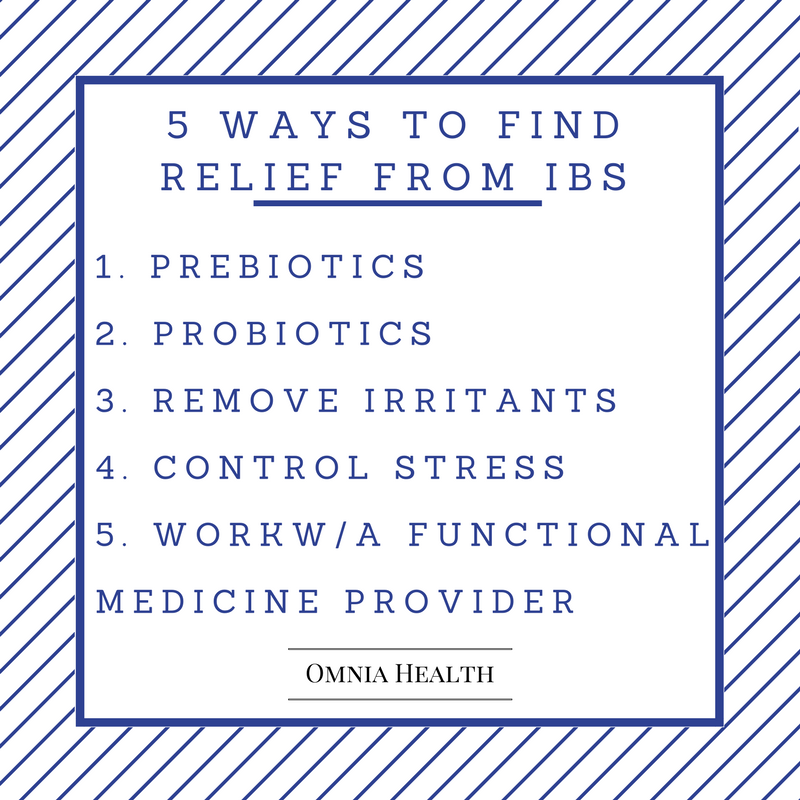Is this you?
You wake up to a beautiful Denver sunrise with a bloated and extended stomach. Immediately, you feel the urge to pass gas.
As you dress for work, you spend time (you don’t have) searching for the right pants you can comfortably wear (and zip) over your poor bloated belly.
At work, your stomach continues to expand and gas continues to build up. You hope that none escapes because you can’t face the embarrassment of releasing it around your coworkers and boss.
It’s so uncomfortable and miserable. You try hard to think what you had for dinner the day before, but nothing sounds like it could be the cause.
You suffer throughout the day to just go home and repeat this routine day in and day out.
It’s okay; you’re not alone.
In fact, up to 38-96 million Americans experience symptoms of IBS but only 5-7% have been diagnosed. At Omnia Health, it’s one of the issues people see us the most about. With our Functional Medicine approach, we are often able to bring significant relief to Denver area patients.
What is IBS and How Does Functional Medicine Help?
From a Functional Medicine perspective, we see IBS, or Irritable Bowel Syndrome, as a very complex disorder. It’s not a single disease with a single cause nor a single treatment.
Instead, complexity occurs due to the multitude of symptoms and a multitude of potential causes.
Mild to severe symptoms can include:
- Bloating
- Gas
- Cramping
- Abdominal pain
- Diarrhea
- Constipation
These symptoms can fluctuate in severity and seemingly at random. (You may not experience them all the time, but rather in waves).
This complex disease isn’t officially considered an autoimmune disease, but it overlaps with similar risk factors of autoimmunity including: leaky gut, dietary factors, infections, inflammation, toxins and stress.
Potential Causes
As mentioned before, when Functional Medicine principles are applied properly, we discover many contributing factors that lead to IBS and for each person it may be slightly different. Some of the most common causes are:
- Overuse of antibiotics
- Stress
- Food allergies or sensitivities
Overuse of Antibiotics
One of the many things that contribute to IBS symptoms is an unhealthy microbiome in your gut.
Your gut can have up to 500 species of bacteria which weighs about 3 pounds! Imagine three pounds of yeast fermenting inside of you… that would produce a lot of gas, right?
Of course your gut is not full of fermenting yeasts (or at least we hope not!) but rather, good bacteria, bad bacteria and SUPER bad bacteria.
When your microbiome is healthy, it has more good bacteria than bad.
When your microbiome is out of balance, it means the bad guys took over – or they went to prohibited areas (like your small intestine).
How is this related to antibiotic use?
Antibiotic drugs don’t kill only the bad guys (like we wish).
Instead, when you take antibiotics you kill most of the bacteria, the good and the bad; you essentially press the restart button for your microbiome!
However, when you do this, often the bad bacteria grows faster because the competition for nutrients in the gut is reduced, and the bad guys take over and inhibit the good bacteria population.
So, the next time you take antibiotics think about your microbiome and the potential effects!
Stress
Research has shown a correlation between high stress levels and increased instances of IBS.
Your brain and your gut share a strong connection via the vagus nerve.
You might be thinking: “Yes, I know that, my brain is always telling my gut – SNACKS, PLEASE!”
However, your brain-gut connection is a two-way pathway. Your gut sends signals to your brain and vice-versa.
Your (healthy) gut produces 95% of your serotonin (a hormone that regulates mood and sleep). However, when your brain is upset (stressed) it sends signals through the vagus nerve which upsets your gut.
This can create IBS-like symptoms such as bloating, gas, diarrhea, constipation, etc.
Now that your gut is unhappy, it reduces serotonin production;
- which less serotonin in your brain makes you feel more stressed
- which reduces the serotonin production in the gut
- which makes you feel more stressed
- which reduces the serotonin
- which makes you feel EVEN MORE STRESSED
- which reduces the serotonin production in the gut
- which makes you feel irritable and cranky
As you can see it can spiral out of control very easily.
Food Allergies and Sensitivity
Many food allergies or sensitivities can have IBS-like symptoms such as gas, abdominal pain, bloating, diarrhea and/or constipation (in addition to many other symptoms).
The most common food allergies or sensitivities that can potentially irritate the digestive system include (but are not limited to) gluten, dairy, soy, eggs, sugar and peanuts.
Perhaps you’ve heard the terms food allergy and food sensitivities thrown around, yet you don’t know the difference.
Food allergies cause a range of symptoms that affect different organs in the body through an acute immune reaction. In some cases, an allergic food reaction can be severe or life-threatening.
Food sensitivities, however, are not true food allergies, but rather low-grade reactions that occur several hours after food is ingested. These reactions can present in many different ways; from IBS-like symptoms to brain fog, fatigue and more…
Find Relief!
Just like different factors contribute to IBS, there is not a “one-size-fits-all” treatment. Everyone is unique and has different reasons that contribute to their IBS, therefore, they need to address the problem from multiple angles to find the root cause(s)! This is what Omnia Health’s Functional Medicine approach does – it dives deep into the real cause instead of just treating uncomfortable symptoms.
Here’s a few potential ways you can find relief: more than one approach may be needed!

- Fertilize your gut so the good guys grow stronger (aka prebiotics)
- Prebiotic Fiber can be found in many fruits and vegetables, such as apple skins, bananas, onions and garlic, Jerusalem artichokes, chicory root and beans
- Add good guys to your diet (aka probiotics)
- Probiotics are found in fermented food, like yogurt (only if you’re tolerant to dairy), kimchi, kombucha or sauerkraut
- Remove irritating foods and irritants from your diet
- This includes (but not limited to) gluten, dairy, corn, soy, eggs, sugar, alcohol, caffeine and drugs.
- Control your stress levels
- Find something that works for you and do it regularly. For example, yoga, meditation, deep breathing, short walks or journaling
- Work with a Functional Medicine provider
- It’s best to work with someone closely to do specialized testing and so they can create a custom treatment plan based on your symptoms and what they identified as the root cause(s).
What did you think of our post?
- Subscribe to our YouTube channel to get alerted when we release new videos!
- Leave a comment below to let us know if the information we provided was helpful. What was your favorite tip?
- Have a topic you’d like us to cover? Tell us in the comments!
- Share this post with others so they can benefit from our tips too!









